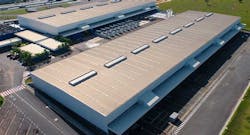Digital Realty Acquires Brazil’s Ascenty for $1.8 Billion
In a sign of the growing importance of the South American market, data center giant Digital Realty will boost its presence on Brazil with the $1.8 billion acquisition of Ascenty, the companies confirmed today. The deal, which had been rumored for several months, reflects the increasingly global nature of the data center business.
Digital Realty’s Brazilian subsidiary will acquire Ascenty from private equity firm Great Hill Partners, adding eight data centers in Brazilian metro areas of São Paulo, Campinas, Rio de Janeiro and Fortaleza.
The structure of the deal also illustrates the growing use of partnerships to support the growth strategies of data center developers. Digital Realty is teaming with investor Brookfield Asset Management to fund the Ascenty acquisition. Brookfield, which has extensive experience in the Brazilian market, will invest $613 million with Digital in a joint venture, and will wind up with a 49 percent equity stake in the Ascenty operation.
The cloud computing boom has boosted investor interest in the data center sector, providing developers with more options to obtain capital to build or acquire data centers. Buying an established business, like Ascenty, provides predictable cash flow for professional investors like Brookfield. In other deals, developers are bundling stabilized data centers into joint ventures.
Growth Opportunity in Latin America
Ascenty is a leading data center provider in Latin America, with most of its facilities built to Tier III standards. It leases space to a number of global hyperscale cloud providers, with over 90 percent of Ascenty’s rent attributable to customers whose parent entities have investment-grade or equivalent credit ratings.
Digital Realty says the Latin American region represents a compelling opportunity for future data center growth, and sees Brazil as the hub of the region’s future technological expansion. The Ascenty portfolio includes 106 megawatts (MWs) of total planned capacity, including 39 megawatts already in service, 34 MWs of capacity under construction and 33 MWs of potential additional capacity. In addition, Ascenty has options or leases on five separate sites representing up to an estimated incremental 66 MWs of future growth capacity. Digital Realty said it expects to invest an additional $425 million to build out the balance of Ascenty’s capacity.
“We expect this acquisition will further accelerate our growth while enhancing our ability to support our customers’ digital transformation across the globe,” said Digital Realty Chief Executive Officer Bill Stein. “This immediately establishes us as a market leader within an historically under-served region poised for rapid growth. We are also gratified to partner with Brookfield on this transaction, leveraging their extensive experience as a regional investor and operator.”
“This immediately establishes us as a market leader within an historically under-served region poised for rapid growth.”
Digital Realty CEO Bill Stein
Ascenty also operates its own 4,500-kilometer fiber optic network connecting Brazil’s primary technology, finance, and population hubs of São Paulo, Campinas, Rio de Janeiro and Fortaleza. The fiber network provides Digital Realty customers with direct access to the major Brazilian telecom operators, peering points and subsea cable networks.
The Ascenty management team will remain in place, led by Ascenty Chief Executive Officer Chris Torto, and will maintain day-to-day responsibility for operations in the region.
“Our combined platform will be uniquely positioned to provide our customers the full spectrum of data center solutions along with the ability to support their growth on a global basis, and we look forward to working with the Digital Realty and Brookfield teams to extend our state-of-the-art data center and connectivity solutions to capitalize on the rapidly growing demand within the region,” said Torto.
Brookfield has been investing in Brazil for over 100 years, with over $40 billion of assets under management, including toll roads, ad rail and port logistics business, a natural gas pipeline system, electric transmission lines, and a portfolio of high-quality commercial properties in São Paulo and Rio de Janeiro. Digital Realty said it “expects to benefit significantly from investing alongside a sophisticated partner with a long history of investing in the region.”
About the Author



